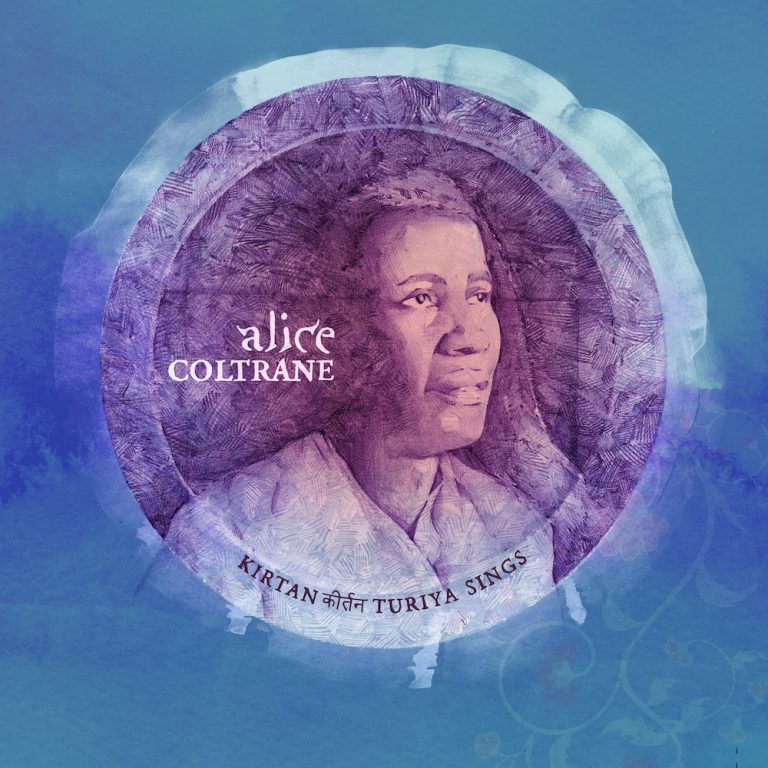The traditional Hindu practice of kirtan consists of devotional, musical chanting in a group setting, often call-and-response style with one leader. The singing of praise in Sanskrit has been practiced for centuries, along with the closely related bhajan. By the 1970s, American interest in eastern philosophies and religions reached an all-time high, and its influence affected the cultural landscape through literature, art and music. The adoption of Vedic practices by people of all races became widespread.
Alice Coltrane had the kind of transcendent talent that cast even the lesser-known works in her catalog as rewarding gems. In 1975, having fully embraced eastern philosophy, Coltrane founded a Vedantic ashram in Southern California. Up until then a longstanding artist for the legendary jazz label Impulse!, she quickly released three albums for Warner Bros., and then made no major-label music for over 25 years. But she was all the while recording and independently releasing music on tape in her ashram. In the 80s and 90s she made four albums, the first called Turiya Sings – the title a reference to her monastic name, Swamini Turiyasangitananda, and the fact that this was the first album featuring her vocals. Sometime around 2010, a cassette rip of this recording made its way around the internet after wading in obscurity for decades, reaching myriad bloggers and music nerds like yours truly. Now officially released digitally for the first time, the album may find an even larger audience.
Kirtan: Turiya Sings is a rare type of reissue in that it doesn’t pile on bonus tracks and odds-and-ends, but actually removes prominent elements of the original issue, presenting the material in a state of stripped-back clarity. In addition to Alice’s voice and organ, the original Turiya Sings featured dramatic strings and synth overdubs, which were completely scrapped for this new version. This decision wasn’t an obvious one, as Ravi Coltrane details in his press release: “It is always difficult to make a creative decision that is counter to what the artist originally chose for their work. It’s always a delicate matter. But as her son, growing up hearing her play these songs and songs like them every day, on the very same Wurlitzer you hear on this recording, I recognize this choice maintains the purity and essence of Alice’s musical and spiritual vision.”
Ravi Coltrane found these original recordings around the time Alice’s final album, Translinear Light, was released in 2004. As contentious as the decision to drastically alter the final product of Turiya Sings may be, I am as confused by the fact that it has taken so long to release the album at all. Fans like me, who have been stirred for several years by the cassette rip, with its lush string arrangements and UFO synths, may be disappointed that it took so long to release an album that is not the one we know and love. We wonder what Alice Coltrane, who left this world in 2007, might think. The otherworldly feel of the original Turiya Sings is gone, and so we are presented with a sound that is very much of this world.
Ravi’s intention, as implied in the quote above, is to give us listeners an idea of what one of Swamini Turiya’s daily devotional chants really sounded like: a typical kirtan, offering not just a musical but a spiritual experience. The Vedic chants take the forefront, and indeed the crystal-clear vocals are the greatest individual aspect of this reissue. Whereas the Turiya Sings cassette rip floated in lo-fi heaven, the new version is comparatively ascetic, but Alice’s voice is gripping in its relative isolation.
The way Coltrane controls her voice is spine-tinglingly masterful. She stretches and pulls it, she warbles, she pauses, then she does it all again. The melody of opener “Jagadishwar” is enough to give the listener chills, or bring one to tears in the right frame of mind. “Jai Rama Chandra” was always the track that did it for me. I have a particular memory, one close to the heart, of being 18 and welling up to this song, and it still wrecks me years later. I am not alone in this reaction, as Radha Botofasina-Reyes, harpist and student of Alice Coltrane, described the profound in-person effects of Alice’s ashram kirtans: “…they could go on for like two or three hours and she would go all over the universe. Sometimes you might have a spiritual heart attack or you could just, just cry and cry and cry.”
“Charanam” is hypnotizing in its circular approach, and breathtaking when it slows down to a crawl at its end, a DJ Screw-via-Krishna consciousness moment. The gentle percussion of closer “Prandhana” teases the possibility of a more rhythmic devotional groove, but it is the last track here. Fortunately, there are further avenues to explore in Coltrane’s ashram music. Luaka Bop’s World Spirituality Classics is a streaming compilation of remasters from the ashram years, including a couple tracks from the excellent Divine Songs tape. And you can watch videotape of an ashram performance on Vimeo (around the 17:36 mark), courtesy of Dublab’s Ashram Tapes project.
Kirtan: Turiya Sings may not be the release that fans of the tape version have expected. There are pros and cons to this reissue’s minimal approach, and I ultimately feel that the original version, in all its hypnagogic glory, retains a certain charm as an unstreamable lo-fi curio. By removing all elements save voice and organ, we have what is essentially a different album. Whether it’s better or not, another Alice Coltrane album is nothing less than a gift.

